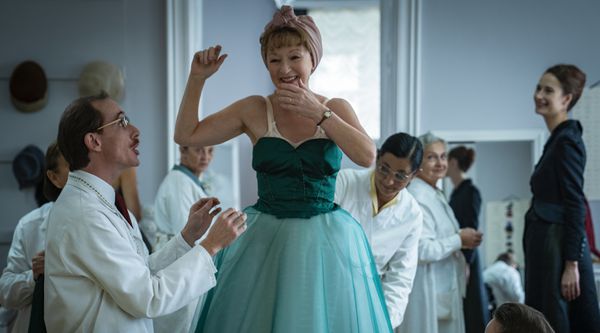Eye For Film >> Movies >> Mrs. Harris Goes To Paris (2022) Film Review
Mrs. Harris Goes To Paris
Reviewed by: Jennie Kermode

A cleaning lady with a simple dream. A long-awaited helping of luck. A visit to a magical city and a series of unlikely encounters which transform her life. Films like this are not everyone’s cup of tea, but if you like yours with four spoonfuls of sugar and a cake on the side, this will be just the thing.
Based on the Paul Gallico novel, but with added romance and an additional layer of happy ending, this is almost pure wish fulfilment fantasy, but it’s delivered with confidence and style. If Lesley Manville looks iconic in the title role, it’s because she has spent much of her career playing cleaning ladies or women in similar professions, frequently in Mike Leigh films. After what those characters have gone through, it seems only fair that she should get to experience something like this. Mrs. Harris, who has lost her husband in the war and works for some monumentally ungrateful employers, gets through life by tossing coins and telling herself each day that this is her lucky day. She has no shortage of friends, chatting eagerly to everyone she meets, but since her Eddie’s death she has not experienced love – until she catches sight of a Christian Dior dress.

In the book, it’s hard work and saving which brings Dior couture within reach. Here, we can see that history of Manville’s face, so the journey is shortened by a bit of luck in the pools and some other unexpected good fortune. As a result, it’s not long before we’re off to Paris, where our heroine takes shelter in a station with a group of homeless men. She may have her heart set on finding the perfect gown, but she has no pretensions. Of course, the senior staff at the House of Dior – most notable Isabelle Huppert’s fierce yet fragile Madame Colbert – don’t see things in quite the same way, and it is only due to the intervention of a visiting marquis (Lambert Wilson) that Mrs. Harris is admitted to the premises at all. Once she is, however, the delight of the staff at the idea that a working class woman could wear one of their gowns kicks off a chain of events which will transform everyone’s lives.
In form, the film is similar to a musical, and one almost wonders if it was conceived as one before the writers realised that there is simply too much plot to leave room for any songs. It’s better this way, because there’s more room for Manville’s performance, which is really what makes it work. Despite getting in a flutter over the attentions of the marquis, Mrs. Harris is not a mere innocent abroad. She has a strong set of working class values and it is her increasing willingness to articulate them, together with her realisation that this can improve the lives of others, that lies at the heart of the film. There is an understanding here that it cannot simply be about looking glamorous in a fabulous frock. It’s the change in Mrs. Harris herself, and her recognition of her own value, which viewers are really there to see.
The film has only a few peripheral villainous characters, as Mrs. Harris is determined to find the good in everyone she meets. Whilst some characters seem a bit too good to be true, they are all carefully drawn and brought to life with the kind of skilful acting which, when successful, goes largely unnoticed. We see just enough famous Parisian locations to make the setting work, but spend a fair bit of time in the city’s more downtrodden areas, with the film’s class consciousness coming to the fore as Mrs. Harris uncovers the secrets behind the glittering façade. Releasing a film about the importance of the labour movement in the present climate is a bold move, and perhaps more powerful here than in the sort of gritty fare which most people not already sympathetic to it will likely stay away from. Critically, this aspect of the film neither interrupts the flow of the film nor stretches credulity with regard to its characters.
Manville has received a Golden Globe nomination for her performance here. It is well deserved. Mrs. Harris Goes To Paris may require a robust tolerance for sugar, but there is something substantial underneath.
Reviewed on: 06 Jan 2023

















